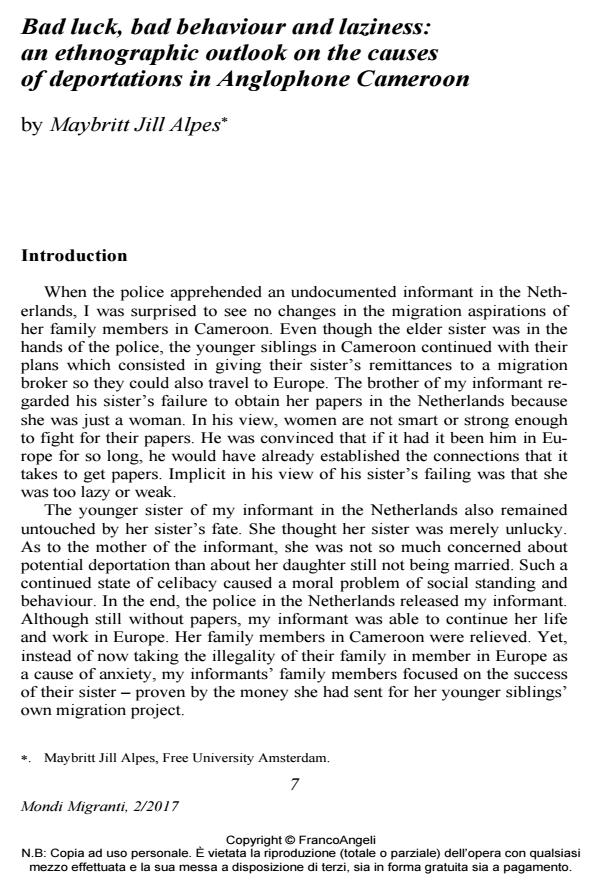Bad luck, bad behaviour and laziness: an ethnographic outlook on the causes of deportations in Anglophone Cameroon
Journal title MONDI MIGRANTI
Author/s Maybritt Jill Alpes
Publishing Year 2017 Issue 2017/2 Language English
Pages 16 P. 7-22 File size 173 KB
DOI 10.3280/MM2017-002001
DOI is like a bar code for intellectual property: to have more infomation
click here
Below, you can see the article first page
If you want to buy this article in PDF format, you can do it, following the instructions to buy download credits

FrancoAngeli is member of Publishers International Linking Association, Inc (PILA), a not-for-profit association which run the CrossRef service enabling links to and from online scholarly content.
This article focuses on people’s perceptions and experiences of deportation policies in an emigration context, such as Anglophone Cameroon. In view of the dominant view in the policy domain that high deportation rates are likely to discourage people from wanting to migrate, the article asks how the direct or indirect experience of a forced return influences people’s migration aspirations and expectations. Based on ethnographic material and life stories of deported migrants gathered over the span of 17 months between 2007 and 2016 in Anglophone Cameroon, the article relates understandings of deportation in Anglophone Cameroon to normative assumptions within migration policy in Western Europe. Deportations do not lower people’s migration aspiration because they are not understood as being caused in a linear fashion through illegality. Instead, causes of deportation are experienced and interpreted as contingent and rooted in individual circumstances.
Keywords: Deportation, Cameroon, migration aspirations, illegality, legal consciousness.
- Alpes M.J. (2011). Bushfalling: How young Cameroonians dare to migrate, (Ph.D. Dissertation, University of Amsterdam, 2011).
- Ambrosini M. (2016). From ‘illegality’ to tolerance and beyond: irregular immigration as a selective and dynamic process. International Migration, 54, 2: 144- 159.
- Castles S. (2010). Why migration policies fail. Ethnic and Racial Studies, 27, 2: 205-227.
- Cwaika M., de Haas H. (2013). The effectiveness of immigration policies. Population and Development Review, 39, 3: 487-508.
- De Bono D. (2016). Returning and Deporting Irregular Migrants: Not a solution to the refugee crisis. Human Geography, 9, 2: 101-112.
- De Genova N., Peutz N., eds. (2010). The deportation regime: sovereignty, space, and the freedom of movement. Durham, NC: Duke University Press.
- De Genova N. (2002). Migrant ‘illegality’ and deportability in everyday life. Annual Review of Anthropology, 31: 419-437.
- Drotbohm H. (2011). On the durability and the decomposition of citizenship: the social logics of forced return migration in Cape Verde. Citizenship Studies, 15, 3-4: 381-396.
- Drotbohm H., Hasselberg, I. (2015). Deportation, Anxiety, Justice: New Ethnographic Perspectives. Journal of Ethnic and Migration Studies, 41, 4: 551-562; DOI: 10.1080/1369183X.2014.957171
- Ellermann A. (2009). States against migrants: deportation in Germany and the United States. Cambridge: Cambridge University Press.
- Evina R.C. (2009). Migration au Cameroun: Profil national 2009. Genève: Iom.
- Ferguson J. (1999). Expectations of modernity Myths and Meanings of Urban Life on the Zambian Copperbelt. Berkeley/Los Angeles: Univ. of California Press.
- Fleury-Steiner B. and Nielsen L.B., eds. (2006). The new civil rights research: A constitutive approach. Vol. ix-xxx. Burlington: Ashgate Publishing.
- Freeman G.P. (1994). Can liberal states control unwanted migration?. The Annals of the American Academy of Political and Social Science, 534: 17- 30.
- Gibney M., Hansen R. (2003). Deportation and the liberal state: The forcible re-turn of asylum seekers and unlawful migrants in Canada, Germany and the United Kingdom. New issues in refugee research, 77, Geneva: Unhcr.
- Goffman E. (1963). Stigma: Notes on the management of spoiled identity. New York: Simon and Schuster.
- Guiraudon V., Lahar G. (2000). A reappraisal of the state sovereignty debate: The case of migration control. Comparative Political Studies, 33, 2: 163-195.
- Le Courrant S. (2015). Vivre sous la menace: Ethnographie de la vie quotdienne des étrangers en situation irrégulière en France. Ph.D. thesis, Paris 10.
- Leerkers A., Broeders D. (2010). A case of mixed motives? Formal and informal functions of administrative immigration detention. British Journal of Criminology, 50, 5: 830-850.
- McCann M. (2006). On legal rights consciousness: A challenging analytical tradition. In: Fleury-Steiner B. and Nielsen L.B., eds., cit.
- Nyers P. (2003). Abject cosmopolitanism: The politics of protection in the anti-deportation movement. Third World Quarterly, 24, 6: 1069-1093.
- Piot C. (2010). Nostalgia for the future: West Africa after the cold war. Chicago: University of Chicago Press.
- Scott J.C. (1998). Seeing like a state: How certain schemes to improve the human condition have failed. New Haven/London: Yale University Press.
- Silbey S. (2005). After legal consciousness. Ann. Review Law Society, 1: 323-368.
- Torpey J. (1998). Coming and going: On the state monopolization of the legitimate ‘means of movement. Sociological Theory, 16, 3: 239-259.
- Walters W. (2002). Deportation, expulsion, and the international police of aliens. Citizenship Studies, 6, 3: 265-292.
- Walters W. (2009). Deportation, expulsion, and the international police of aliens: In: De Genova N. & Peutz N., eds., cit.
- Trajectories and Imaginaries in Migration Maybritt Jill Alpes, pp.77 (ISBN:9781351119665)
Maybritt Jill Alpes, Bad luck, bad behaviour and laziness: an ethnographic outlook on the causes of deportations in Anglophone Cameroon in "MONDI MIGRANTI" 2/2017, pp 7-22, DOI: 10.3280/MM2017-002001